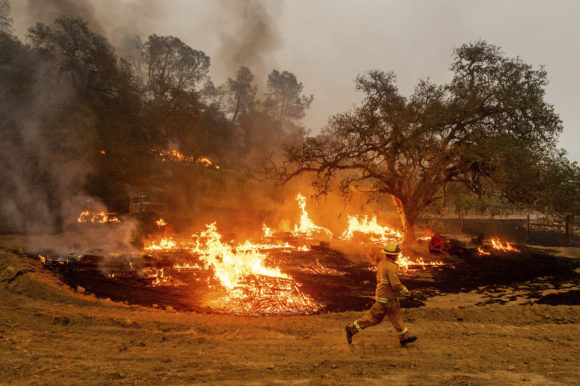SAN FRANCISCO — More than 50,000 California utility customers were without power and others around the state were urged to conserve electricity Thursday amid a fall heat wave that brought another round of extreme wildfire danger.
The National Weather Service issued heat advisories through Friday for temperatures in the 90s and even triple digits in many parts of the state.
Red-flag warnings for extreme fire danger were in place for much of the San Francisco Bay Area where winds bringing hot, dry gusts of up to 55 mph (88.5 kph) were expected to pose a threat of sparking new blazes in a region that already has seen some of the worst wildfires in state history.
A brush fire erupted early Thursday near the inland Southern California city of Redlands, triggering a small evacuation as it grew to about 100 acres (40 hectares), but was about 30% contained before dawn.
The Pacific Gas & Electric utility began shutting off power Wednesday evening to customers in portions of 24 counties, mainly in the Sierra Nevada and the San Francisco Bay Area. The affected customers ranged from 10 in Yolo County to more than 11,300 in Butte County.
The outages were a “last resort option,” said Mark Quinlan, PG&E’s incident commander.
“These are challenging times. Not only are we right in the peak of the wildfire season… many of us are working from home, schooling from home as well,” he said. “We recognize that hardships are introduced when we shut off power.”
Several hundred more customers were expected to experience shutoffs Thursday afternoon in the far northern part of the state.
Numerous studies have linked bigger wildfires in America to climate change from the burning of coal, oil and gas. Scientists have said climate change has made California much drier, meaning trees and other plants are more flammable.
Hot weather also prompted California’s electrical grid operator to issue a statewide “Flex Alert,” urging people to conserve energy between 3 p.m. to 10 p.m. Thursday by turning down their air conditioners and not using major appliances. Previous conservation efforts this summer were praised for reducing the power demand and avoiding rolling blackouts.
PG&E’s power cuts were the third in less than two months. They are aimed at preventing PG&E equipment such as power lines from sparking wildfires if they are fouled or blown down by the winds.
The utility, which was criticized last year when it preemptively turned off electricity to 2 million people, said it was making an effort to use more targeted and shorter outages this time, with power expected to be fully restored by Friday night.
PG&E senior meteorologist Scott Strenfel said the forecast calls for two “back-to-back” periods when “Diablo” winds sweep the region. In addition to high gusts, he said they bring very dry air “and essentially suck the moisture out of vegetation,” leaving it tinder-dry and vulnerable to burning.
Several of the California counties falling under the PG&E shutoffs have already been hit by massive wildfires.
The Glass Fire that ravaged the Northern California wine country of Napa and Sonoma counties was contained Wednesday after destroying more than 1,500 homes and other buildings.
Farther north, the Zogg Fire in Shasta and Tehama counties was also contained. Four people died in that blaze.
More than 8,500 wildfires have burned more than 6,400 square miles (16,000 square kilometers) in California since the start of the year, most since mid-August. Thirty-one people have died, and more than 9,200 buildings have been destroyed.
The fires in California and elsewhere on the West Coast also exposed millions of people to hazardous pollution levels, causing emergency room visits to spike and potentially thousands of deaths among the elderly and infirm, according to an Associated Press analysis of pollution data and interviews with physicians, health authorities and researchers.
Most of the huge fires that erupted over the past eight weeks are now fully or significantly contained but the gains could be hampered if new fires ignite, said Daniel Berlant, assistant deputy director with the California Department of Forestry and Fire Protection, known as Cal Fire.
“If a new fire breaks out, that fire will be able to grow very quickly under these conditions,” Berlant said.
PG&E’s aging equipment has sparked several major fires in recent years, including a 2018 blaze that destroyed much of the town of Paradise and killed 85 people.
The utility pleaded guilty in June to 84 felony counts of involuntary manslaughter _ one death was ruled a suicide _ and paid $25.5 billion in settlements to cover the losses from that and other recent power line-sparked catastrophes.
About the photo: In this Oct. 1, 2020, file photo, a firefighter runs past flames while battling the Glass Fire in a Calistoga, Calif., vineyard. Cool weather and light drizzle in some places provided relief for firefighters working to increase containment of numerous wildfires across California on Saturday, Oct. 10, but the forecast for dry and warming conditions starting on Sunday signaled that the state’s lethal fire season is far from over. (AP Photo/Noah Berger, File)
Was this article valuable?
Here are more articles you may enjoy.


 China Bans Hidden Car Door Handles in World-First Safety Policy
China Bans Hidden Car Door Handles in World-First Safety Policy  Founder of Auto Parts Maker Charged With Fraud That Wiped Out Billions
Founder of Auto Parts Maker Charged With Fraud That Wiped Out Billions  Cape Cod Faces Highest Snow Risk as New Coastal Storm Forms
Cape Cod Faces Highest Snow Risk as New Coastal Storm Forms  FM Using AI to Elevate Claims to Deliver More Than Just Cost Savings
FM Using AI to Elevate Claims to Deliver More Than Just Cost Savings 